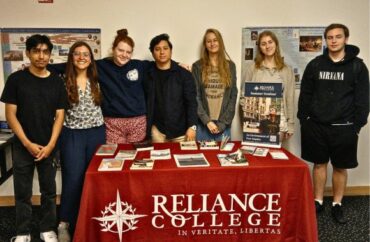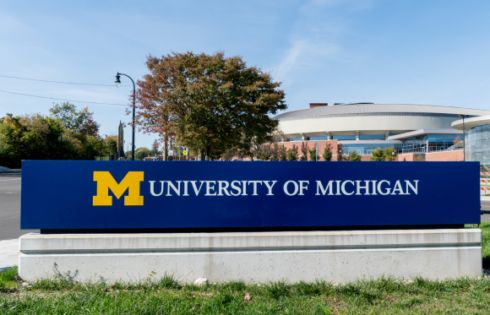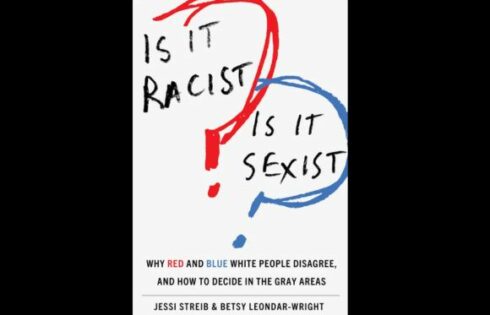
CHICAGO – Seven young adults, including high schoolers, college students, and graduates, are gathering in Chicago this week to discuss “Reason and Love.”
The summer seminar, located at the University of Illinois-Chicago, is put on by self-described “educational entrepreneur” Marsha Enright, who is also starting up Reliance College.
The new college is set to begin in 2026, according to the latest update from Enright.
Throughout the week, students, representing five different countries, will read and discuss the writings of Aristotle, Ayn Rand, Kant, and Enright. But they will also explore the city and play improv games.
The College Fix attended the seminar discussion Wednesday morning.
The seminar uses the Montessori method of “following the child,” according to Enright. She also started a Montessori grade school.
The discussion is “suited to the developmental and psychological needs of the learner to best help him or her grow into a knowledgeable, independent, self-responsible and highly motivated person,” Enright told The College Fix via email prior to Wednesday’s discussion.
“Our objective is to empower you to become a self-motivated, self-reliant, and entrepreneurial individual, capable of finding purpose and meaning in life,” the summer seminar description reads.
During the first discussion Wednesday morning, the students discussed an essay by German philosopher Hans Jonas called “To move and to feel.”
The seven students spend about 90 minutes discussing what makes plants, animals, and human beings different.
They discuss the role of emotion and instinct in action with minimal guidance from the three moderators. Instead, the three moderators jump in to clarify or probe further, but most of the discussio occures between the students.
No one needs to raise their hands, and one moderator encourages the attendees to read body language to see if someone is waiting to jump in with a comment. Paradoxically for a discussion seminar, the students are also encouraged to be okay with silence.
After 90 minutes, the students move into a “debrief,” where they discuss what worked and what did not. Jason, a college professor who assists as a moderator, notes during the morning that a good class should not end with students having all the answers – that means the work was too easy.
The first discussion accomplished this goal, as one student, a high schooler named Savannah Forgy says. It left her with more questions and “a lot more curious.”
MORE: Professor explains how the Great Books changed his life
This also aligns with a goal of Enright, who runs the seminar. She tells the students she wants them to “develop your own responsibility about learning,” explaining why she does not provide summary notes or a cheat sheet.
She also encourages the attendees to work beforehand to sort out their questions.
The student-driven method is further evident during the second morning session, when attendees discuss “The psychology and practice of introspection,” by Enright, who largely declines to participate and provide clarification.
Students pose questions to the group, including one about the obstacles of introspection. Other topics like the difference between a conscious and unconscious mind are also discussed.
“You need to know yourself in order to make decisions,” a college student from Argentina says.
Another, a college student from Ecuador, asks what the object of psychology is.
Another student, an American high schooler expatriate living in Panama, feels free to interject during one part of the discussion to point out it has veered off course and needs to come back on topic. There is no debating or animosity, and during a debrief, attendees agree everything remained civil.
‘I don’t really like institutional education’
Savannah, one of the high school attendees, became involved with the seminar through her high school, the Socratic Experience.
“I don’t really like institutional education,” Savannah told The Fix during an in-person interview after the morning session.
She said she has gone through public schools but left because she likes talking and did not want to just sit there during class.
“I like knowing the why behind things,” Savannah told The Fix.
One of the moderators, who also teaches philosophy in Florida, said the seminar is different from his experience as a college professor. He asked for his last name not to be used due to career concerns.
“As an instructor I often find it is a struggle to have students ask questions when they are confused,” Jason tells The Fix during an in-person interview. But he said this is not the case with the summer seminars.
Beyond Reliance College and these seminars, there might be something broader going on with education, according to Marsha Enright.
The Fix asked her prior to the seminar if she thought there was more innovation, mentioning examples like the College of St. Joseph the Worker and the University of Austin.
“I’m seeing more and more news about new programs, schools, and approaches,” she told The Fix via email. “It looks like many parents and students became fed up with what was being offered during COVID and as they became aware of the huge deficiencies and politicization of so many institutions.”
“And they’re looking for what actually prepares someone for life without breaking the bank.”
MORE: Most university chief diversity officers are black
IMAGE: Matt Lamb for The College Fix
Like The College Fix on Facebook / Follow us on Twitter






Please join the conversation about our stories on Facebook, Twitter, Instagram, Reddit, MeWe, Rumble, Gab, Minds and Gettr.